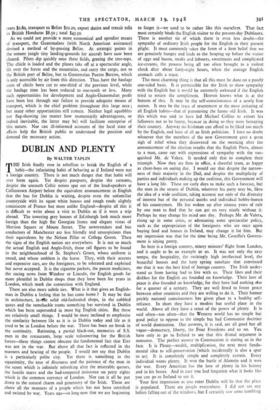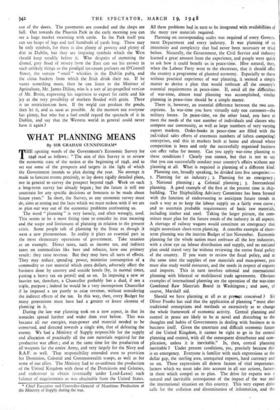DUBLIN AND PLENTY
By WALTER TAPLIN
THE Irish finally rose in rebellion to break the English of a habit—the infuriating habit of behaving as if Ireland were not a foreign country. There is not much danger that that habit will ever form again. Yet despite passports, despite the customs, despite the uncouth Celtic noises spat out of the loud-speakers at Collinstown Airport before the equivalent announcement in English that the bus for Dublin is waiting, despite even the unfamiliar countryside with its squat white houses and rough roads slightly reminiscent of France but most unlike England—despite all this it is difficult to write about a visit to Dublin as if it were a trip abroad. The towering grey houses of Edinburgh look much more foreign than the high flat Georgian fronts and elegant vistas of Merrion Square or Mount Street. The newsvendors and bus conductors of Manchester are less friendly and unsuspicious than their equivalents by the Nelson Pillar or College Green. Then the signs of the English nation are everywhere. It is not so much the actual English and Anglo-Irish, those tall figures to be found in the neighbourhood of St. Stephen's Green, whose uniform is tweed, and whose emblem is the horse. They, with their accents and expensive cars, are the foreigners, to be tolerated and exploited but never accepted. It is the cigarette packets, the patent medicines, the racing news from Windsor or Lincoln, the English goods far more plentiful in Dublin shops than they have been for years in London, which mark the connection with England.
There are also more subtle ties. What is it that gives an English- man in Dublin a feeling that he has come home ? It may be that in architecture, in *Ate solid old-fashioned shops, in the cobbled quays and the ramshackle trams something has survived in Dublin which has been superseded in most big English cities. But these are relatively small things. I would be more inclined to emphasise the similarity between life as it is in Dublin today and life as it used to be in London before the war. There has been no break in the continuity. Rationing, a partial black-out, memories of S.S. men in the restaurants, large scale volunteering for the British forces—these things cannot obscure the fundamental fact that Eire was not in the war. But above all that fact is reflected in the manners and bearing of the people. I would not say that Dublin is a particularly polite city. Yet there is something in the equanimity, the ease of discourse and the patience of the man in the street which is infinitely refreshing after the miserable queues, the hostile stares and the bad-tempered insistence on petty rights which is the common currency of London. Nor can it all be put down to the natural charm and generosity of the Irish. These are above all the manners of a people which has not been stretched and twisted by war. Years ago—so long now that we are beginning to forget it—we used to be rather like this ourselves. That fact most certainly binds the English visitor to the present-day Dubliners. There is another tie of which there is even less doubt—the sympathy of ordinary Irish people for the English in their present plight. It most commonly takes the form of a firm belief that we are genuinely hungry and leads to the heaping up before the visitor of eggs and bacon, steaks and lobsters, sweetmeats and complicated ice-creams, the process being all too often brought to a violent check after about forty-eight hours, when the average English stomach calls a truce.
Tho most charming thing is that all this must be done on a purely one-sided basis. It is permissible for the Irish to show sympathy with the English but it would be extremely awkward if the English tried to return the compliment. Heaven knows what is at the bottom of this. It may be the self-consciousness of a newly free nation. It may be the trace of resentment at the most irritating of all English habits—that of patronising the funny old Irish. It was this which was said to have led Michael Collins to exhort his followers not to be funny, because in doing so they were betraying their country. Anyway no Irishman can afford to be liked too much by the English, and least of all an Irish politician. I have no doubt whatever that the members of the new Government gave a great sigh of relief when they discovered on the morning after the announcement of the election results that the English Press, almost to a man, came out with expressions of sympathy with the van- quished Mr. de Valera. It needed only that to complete their triumph. Now they are firm in office, a cheerful team, as happy as choir-boys on outing day. I would say that despite the narrow- ness of their majority in the Dail, and despite the multiplicity of parties and individuals making up the coalition, this Government will have a long life. These are early days to make such a forecast, but the man in the streets of Dublin, whatever his party may be, likes the idea of a wide coalition, taking account not only of the diversity of interest but of the personal quirks and individual hobby-horses of his countrymen. He has woken up after sixteen years of rule by one man to find that he can get on very nicely without it. Perhaps he may change his mind one day. Perhaps Mr. de Valera, rising up in some crisis, or advocating some spectacular policy, such as the expropriation of the foreigners who are once again buying land and houses in Ireland, may change it for him. But my impression was that for the time being Mr. Costello's Govern- ment is sitting pretty.
So here is a foreign country, ninety minutes' flight from London, and it ought to be an example to us. It was not only the easy tempo, the hospitality, the excitingly high intellectual level, the beautiful houses and the hazy spring sunshine that convinced me that it was the best kind of foreign country. The Irish under- stand us from having had to live with us. Their likes and their dislikes for the English are founded on knowledge. Their love of peace is also founded on knowledge, for they have had nothing else for a quarter of a century. They are well fitted to foster peace between other countries and they are willing to do it. Their former prickly national consciousness has given place to a healthy self- reliance. In short they have a modest but useful place in the world. Above all they have a sense of the power of plenty. It is said often—too often—that the Western world has no simple but good policy to oppose to the simple but bad Communist doctrine of world domination. Our• answers, it is said, are all good but all vague—democracy, liberty, the Four Freedoms and so on. You have only to go to Ireland to see that this dismal argument is nonsense. The perfect answer to Communism is staring us in the face. It is Plenty—wealth, multiplication, the next most funda- mental idea to self-preservation (which incidentally is also a spur to us). It is completely simple and completely certain. Every individual wants plenty. It won the battle of Alamein and it won the war. Every American has the love of plenty in his history and in his bones. And in case you had forgotten what it looks like you can go to Ireland to see it. Your first impression as you enter Dublin will be that the place is populated. There are people everywhere. I did not see any babies falling out of the windows, but I certainly saw some tumbling out of the doors. The pavements are crowded and the shops are full. Out towards the Phoenix Park in the early morning you can see a huge market swarming with cattle. In the Park itself you can see heaps of logs and turf hundreds of yards long. These may be only symbols, for there is also plenty of poverty and plenty of dirt in Dublin, but they are inspiring symbols which the West should keep steadily before it. Who despairs of stemming the dismal, grey flood of misery from the East can see his answer in such unlikely things as the prodigal ice-cream parlours on O'Connell Street, the outsize " small " whiskies in the Dubbin pub% and the china buckets from which the Irish drink their tea. If he wants something more, then he can listen to the Minister of Agriculture, Mr. James Dillon, who is a sort of jet-propelled version of Mr. Bevin, expressing his eagerness to export fat cattle and his joy at the very possibility of markets flooded with grain. There is no restriction:sm here. If the would can produce the goods, then let it, and as soon as possible. At the moment not everyone has plenty, but who but a fool could regard the spectacle of it in Dublin, and say that the Western world in general could never have it again ?































 Previous page
Previous page